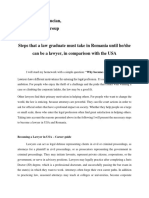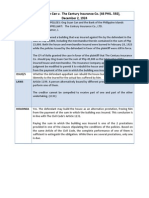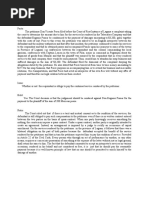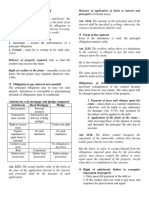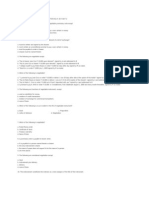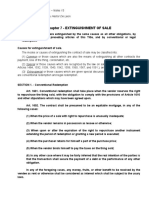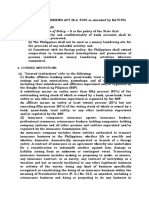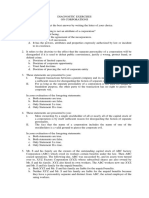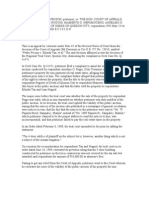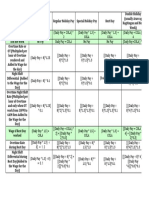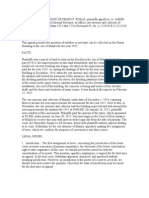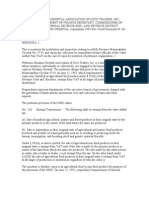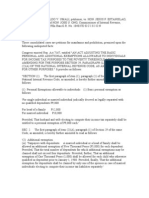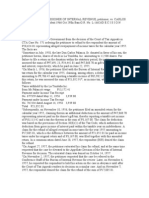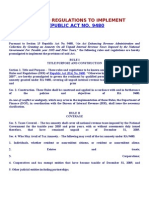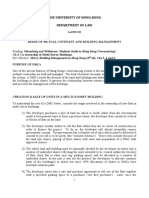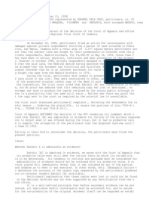Diesel V Jollibee
Diesel V Jollibee
Uploaded by
cmv mendozaCopyright:
Available Formats
Diesel V Jollibee
Diesel V Jollibee
Uploaded by
cmv mendozaOriginal Title
Copyright
Available Formats
Share this document
Did you find this document useful?
Is this content inappropriate?
Copyright:
Available Formats
Diesel V Jollibee
Diesel V Jollibee
Uploaded by
cmv mendozaCopyright:
Available Formats
DIESEL CONSTRUCTION COMPANY, INC. v JOLLIBEE FOODS CORP. GR 136805 PANGANIBAN; JAN.
28, 2000
NATURE Petition for review under Rule 45, assailing 2 resolutions of the CA FACTS - Diesel instituted an action for recovery of escalated construction costs amounting to P4.3m in the RTC Makati, which it had allegedly incurred in constructing buildings for respondent Jollibee in Batangas City and in Calamba, Laguna. - Jollibee, in its Answer, counterclaimed that petitioner allegedly failed to complete the projects on time so they sought recovery of damages and attys fees in the sum of P2.7m - After trial, the RTC ruled that Diesel had completed both projects on time and was entitled to escalated construction costs. - Diesel filed a Notice of Appeal and a Motion for Execution Pending Appeal. Jollibee likewise filed a Notice of Appeal and opposed petitioners prayer for execution pending appeal. - The RTC in a Special Order, allowed execution pending appeal upon the following findings: (1) Diesel was entitled to the payment of escalation cost; (2) Jollibees appeal was only meant to delay payment; and (3) Diesel would post a bond equal to 150% of the total amount of the judgment. - Jollibee filed a MFR with an alternative prayer that it be permitted to post a supersedeas bond pursuant to Rule 39 Sec.3. The RTC however denied the MFR on the ground that the filing of a counterbond was premature, because Diesel had yet to file its own bond. RTC later forwarded the original records of the case to the CA. - Diesel filed with the CA a Motion for Issuance of Writ of Execution on the grounds that the Special Order of the RTC had already become final and executory (Jollibee failed to question its propriety in time) and that it was ready to file the required bond. In response, Jollibee filed a Comment with Motion to Stay Execution by the Posting of Supersedeas Bond. - The CA, in the 1st assailed resolution directed the RTC to issue a writ of execution upon petitioner's posting of a P10m bond, and to stay execution upon respondent's filing of a supersedeas bond of P15m. Diesel filed a MFR regarding the granting of a stay of execution but the CA, in its 2nd assailed resolution, denied said MFR. Hence, this Petition. ISSUES
1. WON a petition for review under Rule 45 is the proper remedy to question an Order (of the CA) staying execution pending appeal 2. WON the CA has jurisdiction to issue such Order and whether estoppel barred petitioner from questioning the CAs jurisdiction 3. Whether the pendency of an appeal or the posting of a supersedeas bond justifies a stay of execution pending appeal. HELD 1. NO. Ratio Rule 45 is the proper remedy to question final judgments, not interlocutory orders of the CA (such as, in this case, a Resolution granting a stay of execution) Reasoning Interlocutory orders are those that determine incidental matters which do not touch on the merits of the case or put an end to the proceedings. It is well-settled that a petition for certiorari under Rule 65, not Rule 45, is the proper remedy to question an improvident order granting execution pending appeal and thereby relieve the adverse party from the immediate effects thereof. The same principle applies to a stay of such execution. *Notwithstanding this procedural error by petitioner, the SC treated the matter as a petition for certiorari under Rule 65, to resolve the substantive and important issues being raised. 2. YES, the law vests the CA with jurisdiction to grant or deny discretionary execution, with or without estoppel on the part of the petitioner. Ratio The CA may not be compelled to enforce a Special Order issued by the trial court. The CA has its own separate and original discretionary jurisdiction to grant or to stay execution pending appeal, except in civil cases decided under the Rules on Summary Procedure and in other cases when the law or the Rules provide otherwise. - From a reading of Rule 42 and Rule 39 Sections 2 and 3, after the perfection of the appeal and the transmittal of the records, the trial court loses jurisdiction over the case. Henceforth, it may no longer grant a motion for, or issue a writ of execution. Reasoning While it is true that the trial court granted the Motion of the petitioner for execution pending appeal, it did not actually issue a writ of execution, because the latter had failed to comply with the Special Order proviso requiring the posting of a bond. Eventually, two separate appeals filed by both parties were perfected, and the records of the case were transmitted by the RTC to the CA. From then on, the trial court lost jurisdiction to issue the said writ. When the petitioner asked the CA for the issuance of the writ at the time, it thereby invoked
the original discretionary jurisdiction of the latter to grant execution pending appeal 3. NO. Ratio The execution of a judgment before its finality must be founded upon good reasons. Good reason imports a superior circumstance that will outweigh injury or damage to the adverse party. Reasoning Petitioner failed to show paramount and compelling reasons of urgency and justice. Petitioner cites as good reason merely the fact that it is a small-time building contractor that could illafford the protracted delay in the reimbursement of the advances it made for the aforesaid increased costs of construction of the [respondent's] buildings. - Petitioner's allegedly precarious financial condition, however, is not by itself a jurisprudentially compelling circumstance warranting immediate execution. The financial distress of a juridical entity is not comparable to a case involving a natural person such as a very old and sickly one without any means of livelihood; an heir seeking an order for support and monthly allowance for subsistence; or one who dies. The alleged financial distress of a corp. does not outweigh the long standing general policy of enforcing only final and executory judgments. A juridical entity has, other than extraordinary execution, alternative remedies like loans, advances, internal cash generation and the like to address IN SUM: the appellate court is authorized by the Rules to order or to stay execution pending appeal upon good reason. Diesels alleged financial distress, by itself, is not a compelling reason to order immediate execution. On the other hand, mere filing by Jollibee of a supersedeas bond does not automatically entitle it to a stay of execution. Disposition assailed Resolutions are SET ASIDE. No good reasons to grant extraordinary execution in the context of the present case.
You might also like
- 27052015REV MS187-gramakhantaamDocument2 pages27052015REV MS187-gramakhantaamRaghu Ram66% (59)
- Corporations - Answers To Diagnostic ExerciseseDocument31 pagesCorporations - Answers To Diagnostic ExerciseseBrent LigsayNo ratings yet
- Sebastian Vs BPI Family Bank - Condensed DigestDocument1 pageSebastian Vs BPI Family Bank - Condensed DigestElijah Lungay SalesNo ratings yet
- Agency Test Bank Soriano 2016Document21 pagesAgency Test Bank Soriano 2016jillianNo ratings yet
- Article 1632 - 1635Document3 pagesArticle 1632 - 1635lexscribisNo ratings yet
- Quiros v. Tan GuinlayDocument1 pageQuiros v. Tan GuinlayJennifer OceñaNo ratings yet
- Basic Concepts of Succession and WIll PDFDocument4 pagesBasic Concepts of Succession and WIll PDFDua LipaNo ratings yet
- Case Digest Week 2 CommodatumDocument3 pagesCase Digest Week 2 CommodatumAnonymous b4ycWuoIcNo ratings yet
- PPE Government Grant Borrowing Cost Intangible AssetsDocument7 pagesPPE Government Grant Borrowing Cost Intangible AssetsLian Garl100% (4)
- Article 1825Document11 pagesArticle 1825Alex Buzarang SubradoNo ratings yet
- Peace Project ProposalDocument14 pagesPeace Project ProposalCzirelle Dominique PapaNo ratings yet
- Steps That A Law Graduate Must TakeDocument5 pagesSteps That A Law Graduate Must TakeAmalia Mihai100% (1)
- Credit AbejarDocument2 pagesCredit AbejarGerwin AbejarNo ratings yet
- 1199 CaseDigest Ong Guan Can V The Century Insurance Co Ainna FathiDocument1 page1199 CaseDigest Ong Guan Can V The Century Insurance Co Ainna FathiAinnaMacalos100% (1)
- Mavest Inc. V. Sampaguita Garment Corporation: TitleDocument3 pagesMavest Inc. V. Sampaguita Garment Corporation: TitleJames MontesNo ratings yet
- 2 Phil 682Document1 page2 Phil 682Dan LocsinNo ratings yet
- NegoIn Section 1-10Document13 pagesNegoIn Section 1-10Aries James67% (3)
- CredTrans Pledge ReviewerDocument8 pagesCredTrans Pledge ReviewerLayaNo ratings yet
- Fria ReviewerDocument5 pagesFria ReviewerPearl Angeli Quisido CanadaNo ratings yet
- Articles 1962-2009Document6 pagesArticles 1962-2009MarkNo ratings yet
- Quiz RA 11232 RCCDocument4 pagesQuiz RA 11232 RCCmosesjordan.reynoNo ratings yet
- Serrano VDocument2 pagesSerrano VT Cel MrmgNo ratings yet
- Articles 2047-2084Document5 pagesArticles 2047-2084MarkNo ratings yet
- Dela Cruz Vs Asian ConsumerDocument5 pagesDela Cruz Vs Asian ConsumerMarion Yves MosonesNo ratings yet
- Teofisto Guingona vs. City Fiscal of ManilaDocument2 pagesTeofisto Guingona vs. City Fiscal of ManilaVienie Ramirez Badang100% (1)
- Bayquen v. Balaoro (LTD)Document2 pagesBayquen v. Balaoro (LTD)noonalawNo ratings yet
- Comparison Pledge Mortgage AntichresisDocument3 pagesComparison Pledge Mortgage AntichresisBenitez Gherold100% (1)
- Oblicon TeasersDocument68 pagesOblicon TeasersJanetGraceDalisayFabrero43% (7)
- LEASEDocument13 pagesLEASEJasielle Leigh UlangkayaNo ratings yet
- ACT1106 - Midterm Quiz No. 2 With AnswerDocument8 pagesACT1106 - Midterm Quiz No. 2 With AnswerPj Dela VegaNo ratings yet
- Contract of Sale: Consensual Bilateral Onerous Commutative Nominate PrincipalDocument12 pagesContract of Sale: Consensual Bilateral Onerous Commutative Nominate PrincipalStephanie Queen OcampoNo ratings yet
- Garcia v. Villar, G. R. No. 158891, June 27, 2012, 675 SCRA 80Document2 pagesGarcia v. Villar, G. R. No. 158891, June 27, 2012, 675 SCRA 80WrenNo ratings yet
- Law 20Document10 pagesLaw 20ram RedNo ratings yet
- Notes AntichresisDocument3 pagesNotes AntichresisLo100% (1)
- Installment Sales - DiscussionDocument5 pagesInstallment Sales - DiscussionJustine SorizoNo ratings yet
- Samson VS Court of Appeals, Santos & Sons IncDocument3 pagesSamson VS Court of Appeals, Santos & Sons IncFebe Anne AglangaoNo ratings yet
- Title Vi Sales MidtermsDocument9 pagesTitle Vi Sales MidtermsLUNANo ratings yet
- FRIA QUIZ With AnswersDocument5 pagesFRIA QUIZ With AnswersAlimodin MalawaniNo ratings yet
- Article 1479:: vs. Lourdes Q. Del Rosario-Suarez, Catalina R. Suarez-De Leon, Wilfredo de Leon, MiguelDocument5 pagesArticle 1479:: vs. Lourdes Q. Del Rosario-Suarez, Catalina R. Suarez-De Leon, Wilfredo de Leon, Miguelzee pNo ratings yet
- Negotiable Instruments Part 1 - REVIEWERDocument23 pagesNegotiable Instruments Part 1 - REVIEWERMilea Kim Karla CabuhatNo ratings yet
- Exercise 1 Key PDF Cost of Goods Sold InvenDocument1 pageExercise 1 Key PDF Cost of Goods Sold InvenAl BertNo ratings yet
- Conventional RedemptionDocument4 pagesConventional RedemptionReinaur Signey Aluning100% (2)
- Negotiable Instruments Reviewer For Bsa 4Document12 pagesNegotiable Instruments Reviewer For Bsa 4Grace AustriaNo ratings yet
- Codal SalesDocument13 pagesCodal SalesFaye AmoradoNo ratings yet
- Chapter 7 - Extinguishment of SaleDocument5 pagesChapter 7 - Extinguishment of SaleYounanymous DecisionNo ratings yet
- Covered InstitutionsDocument16 pagesCovered Institutionsapril75No ratings yet
- Credit CasesDocument6 pagesCredit CasesKFNo ratings yet
- Central Surety V.ubayDocument1 pageCentral Surety V.ubayAices SalvadorNo ratings yet
- TORTSDocument163 pagesTORTSLiene Lalu NadongaNo ratings yet
- SECTION 5 ObliconDocument30 pagesSECTION 5 ObliconAngel CabanNo ratings yet
- UST Cooperative Vs City of ManilaDocument1 pageUST Cooperative Vs City of ManilaKat Jolejole100% (2)
- Articles 2085-2141Document6 pagesArticles 2085-2141MarkNo ratings yet
- ARTICLE 1163 To 1165Document7 pagesARTICLE 1163 To 1165JSPAMoreNo ratings yet
- Donor's Tax: 1. Section 98 To 104 As Amended by TRAIN Law SEC. 98. Imposition of Tax.Document5 pagesDonor's Tax: 1. Section 98 To 104 As Amended by TRAIN Law SEC. 98. Imposition of Tax.Grace EnriquezNo ratings yet
- Quiz 6Document4 pagesQuiz 6Jan NiñoNo ratings yet
- Lesson 3A. Investment On Securities - Please PrintDocument13 pagesLesson 3A. Investment On Securities - Please PrintHail DeityNo ratings yet
- Article 1793Document2 pagesArticle 1793JudyNo ratings yet
- Diagnostic Exercises2Document32 pagesDiagnostic Exercises2HanaNo ratings yet
- A Contract of Sale May Be Absolute or ConditionalDocument5 pagesA Contract of Sale May Be Absolute or ConditionalImthe OneNo ratings yet
- Difference Commodatum v. MutuumDocument3 pagesDifference Commodatum v. MutuumAnjung Manuel CasibangNo ratings yet
- Random SamplingDocument1 pageRandom SamplingYel De LeonNo ratings yet
- Diesel Construction V Jollibee Foods CorpDocument2 pagesDiesel Construction V Jollibee Foods CorpALLAISSANo ratings yet
- 2019 - 06 - 19 GR 200934-35Document3 pages2019 - 06 - 19 GR 200934-35SabNo ratings yet
- Republic Bank V EbradaDocument9 pagesRepublic Bank V Ebradacmv mendozaNo ratings yet
- PNP Manual PDFDocument114 pagesPNP Manual PDFIrish PD100% (9)
- Pecson vs. CADocument4 pagesPecson vs. CAcmv mendozaNo ratings yet
- Taganito vs. Commissioner (1995)Document2 pagesTaganito vs. Commissioner (1995)cmv mendozaNo ratings yet
- BIR Revenue Memorandum Order 10-2014Document17 pagesBIR Revenue Memorandum Order 10-2014PortCalls100% (4)
- Osmena vs. OrbosDocument9 pagesOsmena vs. Orboscmv mendozaNo ratings yet
- Wage Computation TableDocument1 pageWage Computation Tablecmv mendozaNo ratings yet
- DOJ Circular No. 18, 18 June 2014Document2 pagesDOJ Circular No. 18, 18 June 2014cmv mendozaNo ratings yet
- Court of Tax Appeals: Republic of The PhilippinesDocument28 pagesCourt of Tax Appeals: Republic of The Philippinescmv mendozaNo ratings yet
- 1 - Conwi vs. CTA DigestDocument2 pages1 - Conwi vs. CTA Digestcmv mendozaNo ratings yet
- Roxas vs. RaffertyDocument6 pagesRoxas vs. Raffertycmv mendozaNo ratings yet
- Misamis Oriental Assn vs. Dept of FinanceDocument6 pagesMisamis Oriental Assn vs. Dept of Financecmv mendozaNo ratings yet
- Umali vs. EstanislaoDocument8 pagesUmali vs. Estanislaocmv mendozaNo ratings yet
- Tax Alert - 2006 - OctDocument8 pagesTax Alert - 2006 - Octcmv mendozaNo ratings yet
- Tax NotesDocument10 pagesTax Notescmv mendozaNo ratings yet
- BIR Form No. 0618 Download: (Zipped Excel) PDFDocument6 pagesBIR Form No. 0618 Download: (Zipped Excel) PDFcmv mendozaNo ratings yet
- Tax 1 - TereDocument57 pagesTax 1 - Terecmv mendoza100% (1)
- Republic Bank V EbradaDocument9 pagesRepublic Bank V Ebradacmv mendozaNo ratings yet
- Primer On The Tax Amnesty Act of 2007Document8 pagesPrimer On The Tax Amnesty Act of 2007cmv mendozaNo ratings yet
- Conwi vs. CTADocument10 pagesConwi vs. CTAcmv mendozaNo ratings yet
- Commissioner vs. PalancaDocument6 pagesCommissioner vs. Palancacmv mendozaNo ratings yet
- IRR of RA 9480Document7 pagesIRR of RA 9480cmv mendozaNo ratings yet
- 9 - Commissioner vs. PalancaDocument1 page9 - Commissioner vs. Palancacmv mendozaNo ratings yet
- Taxation - 8 Tax Remedies Under NIRCDocument34 pagesTaxation - 8 Tax Remedies Under NIRCcmv mendoza100% (3)
- Remedies Under NIRCDocument14 pagesRemedies Under NIRCcmv mendoza100% (3)
- Ra 9480Document6 pagesRa 9480cmv mendozaNo ratings yet
- Appellants Brief Tutuban CaseDocument4 pagesAppellants Brief Tutuban Casecmv mendozaNo ratings yet
- Remedies Under Local Government CodeDocument15 pagesRemedies Under Local Government Codecmv mendoza100% (4)
- Taxation - 7 Tax Remedies Under LGCDocument3 pagesTaxation - 7 Tax Remedies Under LGCcmv mendozaNo ratings yet
- Tax 2 Finals ReviewerDocument19 pagesTax 2 Finals Reviewerapi-3837022100% (2)
- The University of Hong Kong Department of Law: Land Iii Deeds of Mutual Covenant and Building ManagementDocument28 pagesThe University of Hong Kong Department of Law: Land Iii Deeds of Mutual Covenant and Building Managementwy Bagel100% (1)
- SL BLR 28022020Document13 pagesSL BLR 28022020Swagath NNo ratings yet
- CRIM 5 - SyllabusDocument12 pagesCRIM 5 - SyllabusJohn Philip DunqueNo ratings yet
- Contract ManagementDocument54 pagesContract ManagementNelsonMoseMNo ratings yet
- British India All ActsDocument1 pageBritish India All ActsShivangi Sharma75% (4)
- Evidence Objections To DeclarationDocument47 pagesEvidence Objections To DeclarationRichard MathiasNo ratings yet
- Medical Certifications PANAMA MMC-261june2013Document3 pagesMedical Certifications PANAMA MMC-261june2013Ricardo AquinoNo ratings yet
- STAT v. Beard Head - Order Granting Motion To Voluntarily DismissDocument3 pagesSTAT v. Beard Head - Order Granting Motion To Voluntarily DismissSarah BursteinNo ratings yet
- Case Concerning Armed Activities On The Territory of The Congo (New Application 2002)Document8 pagesCase Concerning Armed Activities On The Territory of The Congo (New Application 2002)adriandanniel57No ratings yet
- Jaswant Sugar Mills LTD Meerut Vs LakshmichandDocument12 pagesJaswant Sugar Mills LTD Meerut Vs LakshmichandRam MalaniNo ratings yet
- Silos vs. Philippine National Bank, 728, SCRA 617 (2014)Document29 pagesSilos vs. Philippine National Bank, 728, SCRA 617 (2014)Jennifer ArcadioNo ratings yet
- Delacruz Vs CA Case DigestDocument2 pagesDelacruz Vs CA Case DigestLaine Mongan100% (2)
- Memorandum of Agreement 2017Document4 pagesMemorandum of Agreement 2017Mapulang Lupa Valenzuela City100% (1)
- To Dismiss: Dogketel) - May 2016 '. : f7"""""-"Document13 pagesTo Dismiss: Dogketel) - May 2016 '. : f7"""""-"luck1311No ratings yet
- Administrative Cases of PoliceDocument24 pagesAdministrative Cases of PoliceChing Dialoma0% (1)
- Legal NoticeDocument6 pagesLegal NoticeUmair Ahmed Andrabi100% (1)
- HCS (Judicial Branch) PAPERATHONDocument10 pagesHCS (Judicial Branch) PAPERATHONraghavmayank886No ratings yet
- In The Court of Senior Civil Judge RawalpindiDocument5 pagesIn The Court of Senior Civil Judge RawalpindiRaja Abdul Qadeer JanjuaNo ratings yet
- Labagala Vs SantiagoDocument3 pagesLabagala Vs SantiagophgmbNo ratings yet
- Philippine Suburban Dev Vs Auditor GeneralDocument3 pagesPhilippine Suburban Dev Vs Auditor GeneralhappymabeeNo ratings yet
- 110828-Magistrates Court of Victoria - No 1158210495Document5 pages110828-Magistrates Court of Victoria - No 1158210495Gerrit Hendrik Schorel-Hlavka100% (1)
- Utah Republican Party Platform 2009Document3 pagesUtah Republican Party Platform 2009The Salt Lake TribuneNo ratings yet
- Montenegro Vs COADocument13 pagesMontenegro Vs COAFacio BoniNo ratings yet
- 04 Fay V WitteDocument2 pages04 Fay V WitteDino Roel De GuzmanNo ratings yet
- Hostel Affidavit MensDocument4 pagesHostel Affidavit MensNaruto UzumakiNo ratings yet
- VOluntary SeparationDocument11 pagesVOluntary SeparationMissy VRBNo ratings yet
- Test Bank For Correctional Administration Integrating Theory and Practice, 3e Richard SeiterDocument17 pagesTest Bank For Correctional Administration Integrating Theory and Practice, 3e Richard Seiterrazayazdani53No ratings yet











